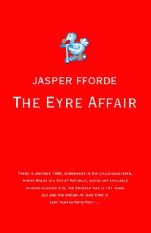
The Eyre Affair
Jasper Fforde
384 pages
published in 2001
The problem with The Eyre Affair, according to China Miéville, is its refusal to take itself seriously. In his view an author should treat their stories with respect, no matter how absurd they are. An writer should believe in his stories, not wink at his readers and tell them that they're too smart to believe all this silliness and isn't it all funny? Case in point, the heroine's name, Thursday Next. Here is a name, says Miéville, that crashes through the fourth wall and jolts you out of the story to show off the author's cleverness and how they and you are all above this sort of thing.
He has a point there, but I cannot bring myself to utterly condemn this book. Despite its metatextual gamesmanship, its everything including the kitchen sink approach to world building and the 6 foot high neon signs flashing "danger! not to be taken too seriously!" I still quite enjoyed it. It's not the masterpiece some held it for, but it isn't as awful as Miéville would lead you to believe either.
The Eyre Affair stars Thursday Next, an operative for the Special Operatives Network, the special forces for those things too unusual for the regular police to handle. She is with department 27, the literary dectives or LiteraTecs. She is also a veteran of the Crimean War, from the Charge of the Light Armoured Division in fact, a war now in its 131st year, having started in 1854. She's from an unusual family, with her uncle Mycroft being the type of mad scientific genius always inventing stuff and being kidnapped by foreign agents and her father having been erased from history when he defected from Special Operatives 12, the ChronoGuards, and started waging his oneman war against the bureaucrats in the department of Special Temporal Stability...
Her adventures begin when the original draft of Dickens' Martin Chuzzlewit is stolen from the highly secured manuscript room at Gad's Hill. It is an impossible theft and the consequences of it could be very bad, if some terrorist has taken it to hold ransom --if destroyed or altered who knows what would happen to all later copies of Martin Chuzzlewit?
Unfortunately, things might even be more desparate than they seem at first, as Thursday is approaced by SO5, one of the smallest Special Operations departments, charged with tracking down and eliminating Acheron Hades, the third most wanted person on the planet, who is the one who stole Martin Chuzzlewit and has nefarious plans for it. From there on, things get weirder...
Despite what I said in the beginning of this review, The Eyre Affair is actually reasonably well structured. The plot moves itself along quite well, fast enough to stay compelling, never actually derailing; it's just that every other chapter or so Fforde puts it on a sidetrack in favour of a setpiece. Some of these succeed better than others. One example is the Richard III play Fforde describes, done in the style of a Rocky Horror Show performance, complete with enthusiastic audience ritual heckling. Another is the guided tour Thursday gets in her uncle's shed, detailing his wacky inventions, lifted straight from any James Bond film, with her uncle as Q.
Apart from these setpieces, there are also distractions in the form of massive pieces of exposition. Fforde clearly doesn't believe in incluing his readers about how different this particular England is: he'd rather club you over the head with it. Which in the later stages of the book gets a bit wearing.
Logically speaking, the whole universum he has build in this book makes no sense. There are too many different weird things taken matter of factly, too many detours of history happening after each other which could not have happened due to earlier developments, like England having been occupied by the nazis in World War II, yet also still fighting the Crimean War with Imperial Russia in 1985, or the widespread and hobbyist cloning of extinct species, but without the benefit of digital computers...
But this all matters less than you'd think, as Fforde is a writer good enough to pull you over the rough spots. If you think of this as the science fictional equivalent of Marvel or DC's superheroes universes, you'll get the right impression.
If, like China Miéville, you are allergic to whimsy, this is not the novel for you. If you're not bothered by this sort of thing and actually likes the audacity of Fforde to create such an unlikely and strange world, there is plenty here to keep you amused.
